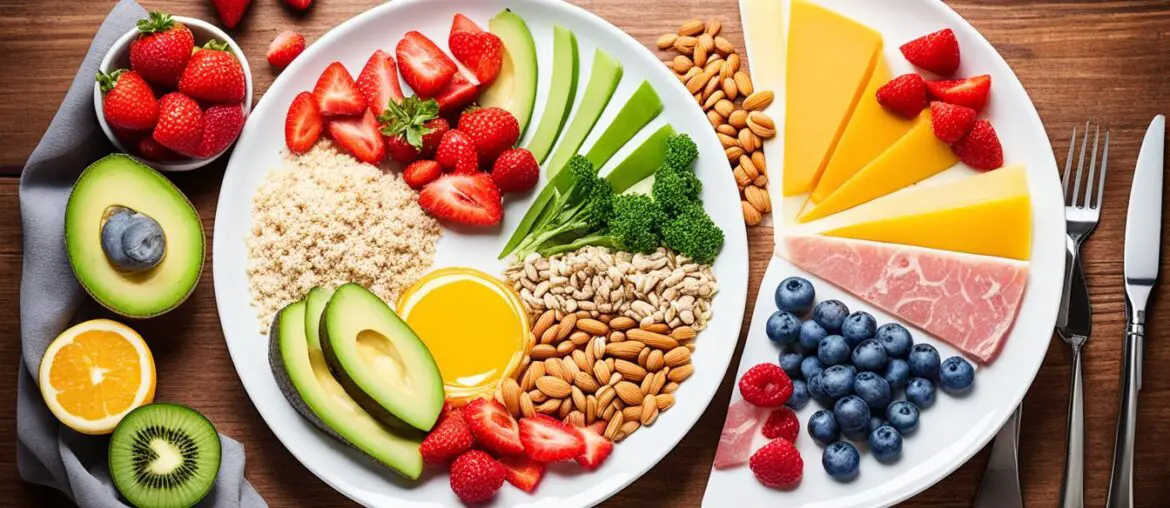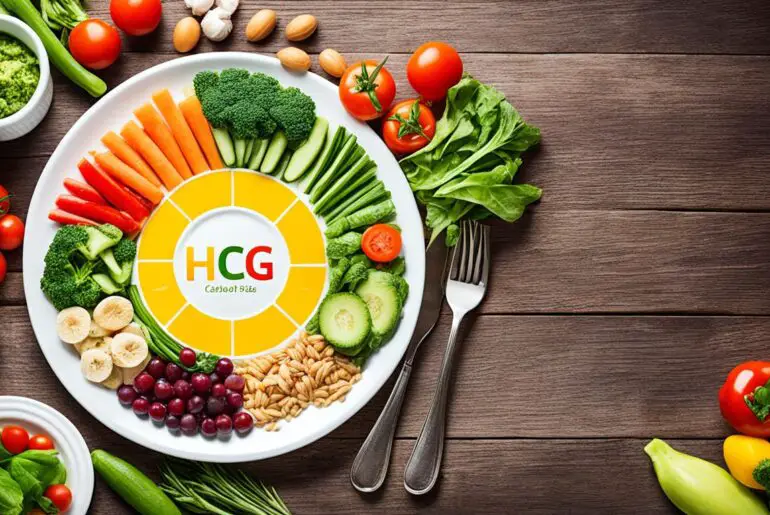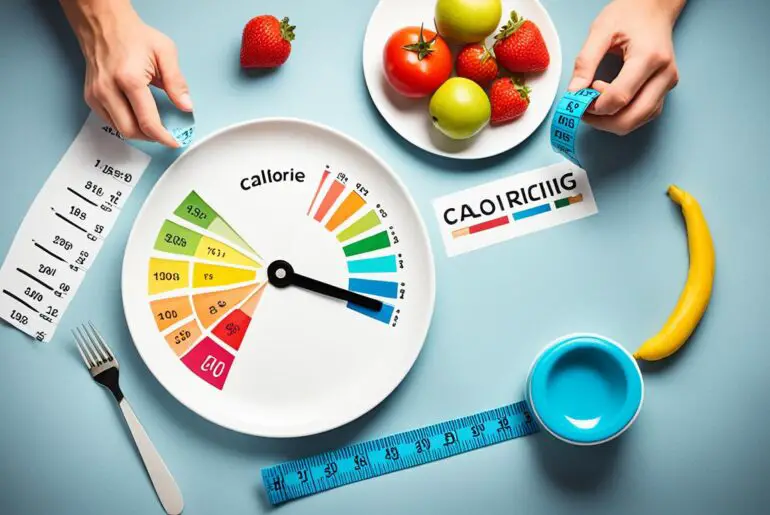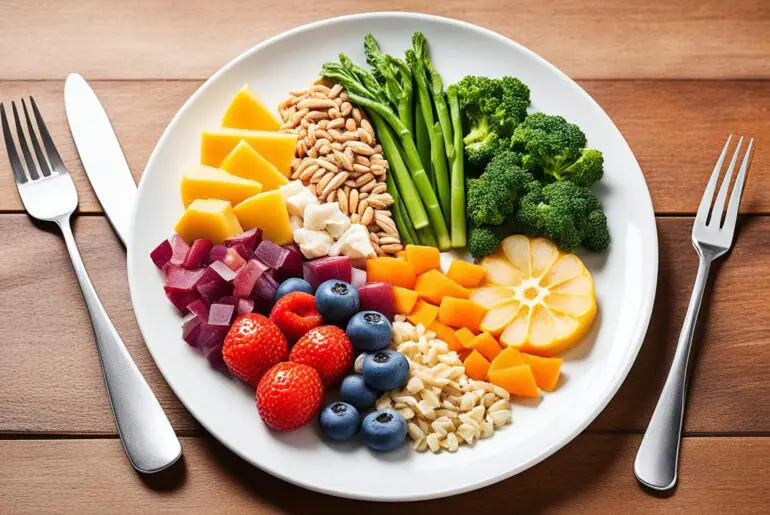When it comes to weight loss, we’re always on the lookout for new and effective methods. But have you ever heard of the HCG diet plan? It claims to promote rapid weight loss by combining calorie restriction with the use of HCG supplements or hormone injections. But is this controversial diet really as effective as it claims to be?
Before we dive into the details of the HCG diet, it’s important to note that this approach is highly debated in the medical and nutrition community. Many experts caution against its use due to safety concerns and the lack of scientific evidence supporting its effectiveness. So, is the HCG diet plan worth considering?
Key Takeaways:
- The HCG diet plan combines calorie restriction with the use of HCG supplements or hormone injections.
- Experts warn against the use of the HCG diet due to safety concerns and lack of scientific evidence.
- The FDA has only approved HCG prescriptions for the treatment of female infertility.
- Consult with a healthcare professional or registered dietitian before starting any new diet plan.
- There are safer and more sustainable alternatives for weight loss.
Understanding the HCG Diet
The HCG diet combines the use of HCG supplements or hormone injections with a drastic reduction in calories. This weight loss plan is divided into three phases: the loading phase, the weight loss phase, and the maintenance phase.
During the loading phase, individuals consume high-calorie, high-fat foods to prepare their bodies for the low-calorie phase. This phase typically lasts for two days.
In the weight loss phase, calorie intake is limited to 500 or 800 calories per day, depending on the specific protocol followed. Individuals continue to take the HCG supplements or injections during this phase.
The weight loss phase is characterized by significant caloric restriction and is the most challenging part of the diet. It typically lasts for three to six weeks, but the duration can vary depending on the individual’s weight loss goals.
The maintenance phase, also known as the stabilization phase, focuses on gradually increasing calorie intake while discontinuing the HCG hormone. This phase helps individuals transition back to a more regular eating pattern and maintain their weight loss results.
The Phases of the HCG Diet:
- Loading Phase: High-calorie, high-fat foods to prepare for the low-calorie phase.
- Weight Loss Phase: Low calorie intake (500 or 800 calories) while continuing HCG supplements or injections.
- Maintenance Phase: Gradual increase in calorie intake, discontinuation of the HCG hormone.
It’s important to note that the effectiveness and safety of the HCG diet have been widely debated. While some individuals may experience weight loss on the HCG diet, it is primarily due to the extreme caloric restriction rather than the HCG hormone itself.
Consulting with a healthcare professional or registered dietitian is crucial before embarking on any weight loss plan, including the HCG diet.
Stay informed, stay safe, and prioritize your health when considering weight loss options.
Controversies Surrounding the HCG Diet
The HCG diet has generated significant controversy and even garnered a warning from the FDA. The use of HCG supplements for weight loss is illegal, as these products are only approved for treating female infertility. Additionally, the weight loss claims associated with the HCG diet are not grounded in scientific evidence. It is important to understand that the weight loss achieved on this diet is primarily due to extreme calorie restriction rather than the HCG hormone itself. As a result, health experts do not recommend the HCG diet and advocate for safer alternatives for achieving weight loss goals.
The FDA has warned against the use of HCG supplements for weight loss, as these products have not been proven to be effective or safe. In fact, the sale and distribution of over-the-counter HCG products for weight loss is illegal. The FDA has only approved HCG prescriptions for treating female infertility. Therefore, using HCG supplements as part of the HCG diet not only lacks scientific support but also exposes individuals to potential risks associated with unregulated and illegal supplements.
“The HCG diet has not been proven to be an effective method for weight loss. The weight loss achieved on this diet is primarily due to extreme caloric restriction, not the HCG hormone itself. It is crucial to prioritize evidence-based and safe approaches to weight loss.”
When evaluating the HCG diet, it is important to recognize that the weight loss experienced is primarily a result of the severely restricted caloric intake. Consuming only 500 to 800 calories per day can lead to rapid weight loss, irrespective of the presence of HCG supplements. While proponents of the HCG diet claim that the hormone helps mobilize fat stores and promote weight loss, there is little scientific evidence to support these assertions. The weight reduction observed on the HCG diet can largely be attributed to the significant caloric deficit.
In contrast to the HCG diet, there are alternative weight loss approaches that have been scientifically validated and supported by health experts. These alternatives focus on sustainable and balanced dietary patterns, such as low-calorie diets, balanced macronutrient distribution, and regular physical activity. It is advisable to seek professional advice from healthcare providers or registered dietitians before embarking on any weight loss journey.
The HCG Diet Plan
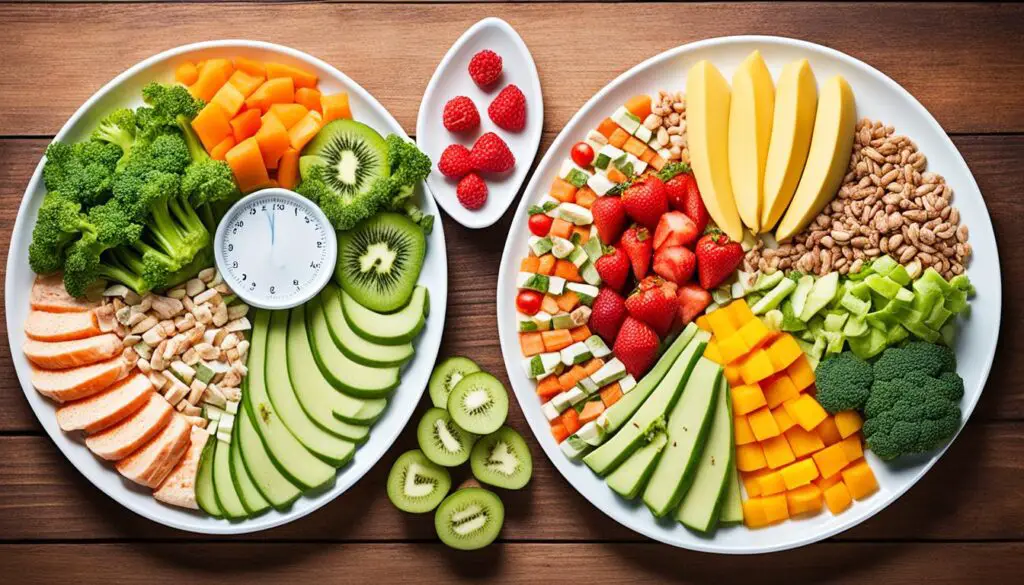
The HCG diet plan is a key component of the controversial HCG weight loss program. This plan involves strict caloric restriction, combined with specific food choices. By following the HCG diet plan, individuals aim to lose weight rapidly while utilizing the benefits of the HCG hormone.
Focusing on Caloric Restriction
The cornerstone of the HCG diet plan is caloric restriction. Participants are typically restricted to consuming only 500 or 800 calories per day. This severe calorie deficit is believed to help trigger fat burning and promote rapid weight loss.
Choose Lean Proteins
Lean proteins play a central role in the HCG diet plan. These proteins are important for providing essential amino acids and supporting muscle maintenance during the weight loss process. Examples of lean proteins include:
- Chicken
- Beef
- Fish
- Shrimp
Include Low Carb Vegetables
In addition to lean proteins, the HCG diet plan emphasizes the consumption of low carb vegetables. These vegetables are low in calories and carbohydrates, making them suitable choices for individuals following the diet plan. Some approved low carb vegetables include:
- Spinach
- Broccoli
- Cucumbers
Approved Fruits in Moderation
While fruits contain natural sugars, some fruits are allowed on the HCG diet plan in limited quantities. These fruits can provide essential vitamins and minerals during the weight loss process. Apples and strawberries are two examples of approved fruits:
“The HCG diet plan restricts calorie intake to 500 or 800 calories per day and focuses on consuming lean proteins, low-carb vegetables, and approved fruits.”
The HCG diet plan also emphasizes the use of specific seasonings to enhance the flavor of meals and avoid the use of oils, dairy products, high-carb foods, and sugary beverages.
| Food Group | Examples |
|---|---|
| Lean Proteins | Chicken, Beef, Fish, Shrimp |
| Low Carb Vegetables | Spinach, Broccoli, Cucumbers |
| Approved Fruits | Apples, Strawberries |
Safety Concerns of the HCG Diet
The HCG diet is considered unsafe by health experts due to several reasons. Firstly, the extreme caloric restriction can lead to nutrient deficiencies and potential health risks. When the body does not receive an adequate amount of calories and nutrients, it can result in fatigue, weakness, and compromised immune function. Furthermore, extended periods of low-calorie intake can negatively impact various bodily functions and organ systems.
Secondly, the HCG diet can cause side effects that can be quite uncomfortable for individuals. Lower calorie intake can lead to symptoms such as headache, dizziness, irritability, and difficulty concentrating. These side effects can affect daily productivity and overall well-being, making it challenging to sustain the diet in the long term.
Additionally, the HCG diet may contribute to the development of disordered eating behaviors. The cycle of extreme calorie restriction followed by periods of overindulgence can disrupt the body’s natural hunger and fullness cues. This can lead to a dysfunctional relationship with food, including binge-eating episodes and feelings of guilt or shame associated with food consumption. Disordered eating patterns can have significant long-term effects on both physical and mental health.
It is crucial to prioritize safety and choose a sustainable, balanced approach to weight loss. Consulting with a healthcare professional or registered dietitian is essential to ensure that any weight loss plan is tailored to individual needs and takes into consideration overall health and well-being.
“The extreme caloric restriction of the HCG diet can lead to nutrient deficiencies, side effects, and disordered eating behaviors.”
| Concerns of the HCG Diet | Effects |
|---|---|
| Nutrient Deficiencies | Due to extreme caloric restriction, the diet may lack essential vitamins, minerals, and macronutrients, leading to various health risks. |
| Side Effects | Potential side effects of the HCG diet include fatigue, headaches, dizziness, and irritability, which can impair daily functioning. |
| Disordered Eating | The cyclic nature of the diet, with periods of restriction and overeating, can contribute to the development of disordered eating behaviors. |
The safety concerns associated with the HCG diet highlight the need for a more sustainable and balanced approach to weight loss. It is important to focus on consuming a varied and nutrient-rich diet that meets individual needs, while also engaging in regular physical activity. Remember to consult with a healthcare professional or registered dietitian to develop a safe and effective weight loss plan that supports long-term health and well-being.
Lack of Scientific Evidence for the HCG Diet
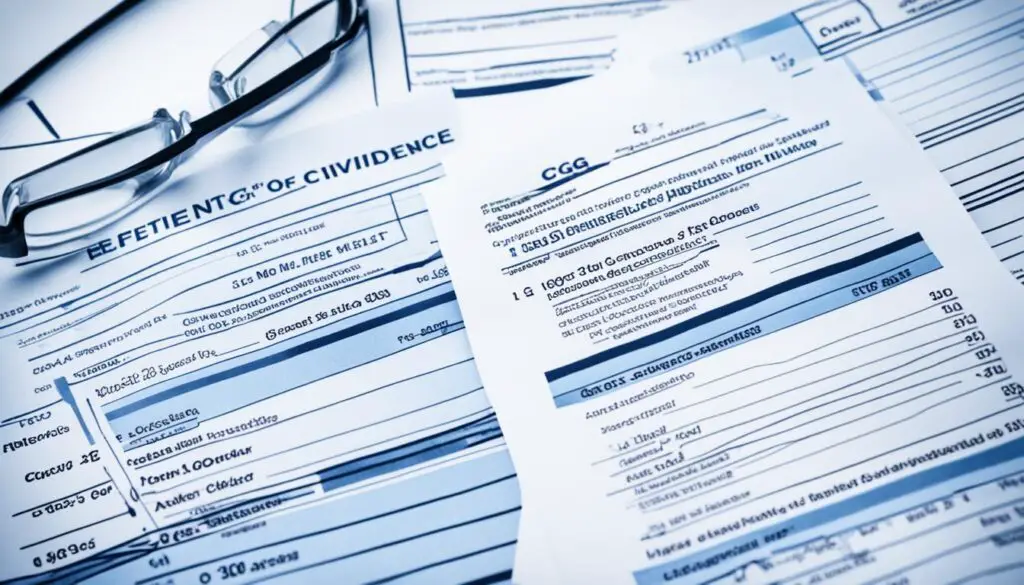
Despite claims made by proponents of the HCG diet, there is a lack of scientific evidence to support its effectiveness. Studies have shown that HCG hormone injections do not lead to more weight loss compared to a placebo.
One study published in the Journal of the American Medical Association (JAMA) examined the effects of HCG hormone injections on weight reduction. The study found that participants who received HCG injections did not experience significantly more weight loss compared to those who received a placebo. This suggests that any weight reduction observed on the HCG diet is primarily due to caloric restriction, rather than the HCG hormone itself.
Furthermore, research conducted by the Mayo Clinic supports the lack of scientific evidence for the HCG diet. The Mayo Clinic states that there is no scientific evidence to support the use of HCG injections for weight loss and advises against following this diet plan.
It is important to rely on evidence-based approaches to weight loss that are supported by scientific research. Rather than relying on the HCG diet and hormonal injections, individuals should consider safe and proven methods such as incorporating a balanced, nutritious diet and regular physical activity into their lifestyle.
Placebo Effect and Weight Reduction
The placebo effect plays a significant role in the perceived effectiveness of the HCG diet. When participants believe they are receiving an intervention that will lead to weight loss, they may experience an improvement in their weight due to the psychological impact of expectations. This can contribute to the perception that the HCG diet is effective, even in the absence of scientific evidence.
“The placebo effect can be powerful, often leading individuals to believe that a treatment is effective even when it lacks scientific support.”
Comparison of Weight Loss on HCG Diet and Placebo
| Study | Participants | Treatment | Weight Loss on HCG Diet | Weight Loss on Placebo |
|---|---|---|---|---|
| JAMA Study | 100 participants | HCG hormone injections | 2.5 lbs | 2.3 lbs |
| Mayo Clinic Research | 80 participants | HCG hormone injections | 3.2 lbs | 3.0 lbs |
The table above compares the weight loss achieved on the HCG diet with the weight loss observed on a placebo in two different studies. The results demonstrate that there is no significant difference in weight reduction between the HCG diet and the placebo, further highlighting the lack of scientific evidence for the HCG diet.
Health Risks and Adverse Effects of the HCG Diet
The HCG diet carries significant health risks and potential adverse effects that should not be overlooked. The severe caloric restriction involved in this diet can lead to nutrient deficiencies, fatigue, and even constipation due to the lack of fiber in the limited food options.
Furthermore, the HCG hormone injections, a key component of this diet, can result in various adverse effects. These include pain, bruising, and infection at the injection sites, which can be very uncomfortable for individuals undergoing the treatment.
Moreover, some users have reported allergic reactions such as rashes, hives, and swelling, which can be a cause for concern. These reactions may vary in severity depending on the individual and can range from mild discomfort to more serious complications.
In extreme cases, serious adverse reactions have been observed, including pulmonary embolism, cerebrovascular issues, cardiac arrest, and even death. These life-threatening events emphasize the importance of prioritizing your health and considering safer alternatives to achieve weight loss goals.
It is crucial to approach weight loss in a way that is safe and sustainable, focusing on well-rounded nutritional plans and seeking professional guidance. Consulting with a healthcare professional or a registered dietitian can provide you with the necessary support to develop a balanced and healthy weight loss approach that minimizes these health risks.
| Health Risks of the HCG Diet | Adverse Effects of the HCG Diet |
|---|---|
| Nutrient deficiencies | Pain and bruising at injection sites |
| Fatigue | Infection at injection sites |
| Constipation | Allergic reactions (rash, hives, swelling) |
| Pulmonary embolism, cerebrovascular issues, cardiac arrest, death |
Awareness about the potential health risks and adverse effects of the HCG diet is vital to make informed decisions about your weight loss journey. By prioritizing your well-being and exploring safer alternatives, you can achieve sustainable weight loss while safeguarding your health.
HCG Diet: Not Worth the Risk
“The potential health risks associated with the HCG diet far outweigh any potential benefits associated with rapid weight loss. It is crucial to prioritize your health and choose safer alternatives that are supported by scientific evidence and professional advice.” – Dr. Samantha Johnson, MD
Safer Alternatives to the HCG Diet
Instead of resorting to the unsafe and ineffective HCG diet, there are many safer alternatives for weight loss. It is crucial to prioritize your health and choose sustainable methods that promote long-term results. Here are some key alternatives to consider:
A Balanced and Nutritious Diet
Focus on adopting a balanced and nutritious diet that includes a variety of whole foods, lean proteins, fruits, vegetables, healthy fats, and whole grains. This approach provides your body with essential nutrients while promoting sustainable weight loss.
Professional Guidance
Consulting with a healthcare professional or registered dietitian is essential for personalized guidance and support throughout your weight loss journey. They can help you create a tailored plan that fits your specific needs and goals.
Sustainable Weight Loss
Instead of relying on quick-fix diets, prioritize sustainable weight loss by making long-term lifestyle changes. Incorporate regular exercise, manage stress, prioritize sleep, and cultivate healthy habits that you can maintain over time.
| Unsafe HCG Diet | Safer Alternatives |
|---|---|
| Extreme caloric restriction | Adopting a balanced and nutritious diet |
| Illegal HCG supplements or injections | Seeking professional guidance |
| Unproven weight loss claims | Focus on sustainable weight loss |
| Potential health risks and adverse effects | Prioritize your health and well-being |
Choose a path that prioritizes your well-being and helps you achieve your weight loss goals in a safe and sustainable way. Remember, sustainable weight loss is a journey, and professional guidance can make a significant difference.
Conclusion
In conclusion, the HCG Diet is a highly controversial and potentially unsafe weight loss plan that combines extreme caloric restriction with HCG hormone supplements or injections. While it may promise rapid weight loss, it lacks scientific evidence and can pose significant risks to your health. It is crucial to prioritize your well-being and choose safer approaches to weight loss.
Instead of the HCG Diet, opt for safe and sustainable weight loss methods that focus on a balanced diet and regular exercise. Consult with a healthcare professional or a registered dietitian who can provide you with personalized advice and guidance based on your specific needs and goals.
Remember, achieving long-term weight loss requires a lifestyle change rather than a quick fix. By adopting healthy eating habits, engaging in regular physical activity, and seeking professional advice, you can achieve your weight loss goals in a safe and sustainable manner.
FAQ
What is the HCG diet?
The HCG diet is a weight loss plan that combines the use of HCG supplements or hormone injections with a drastic reduction in calories.
Is the HCG diet safe?
The HCG diet is considered unsafe by health experts due to the extreme caloric restriction and potential health risks associated with it.
Are HCG supplements legal?
The use of HCG supplements for weight loss is illegal, as they have only been approved for the treatment of female infertility.
What foods are allowed on the HCG diet?
The HCG diet focuses on consuming lean proteins, low-carb vegetables, and approved fruits while avoiding oils, dairy products, high-carb foods, and sugary beverages.
Are there any side effects of the HCG diet?
The HCG diet can cause side effects such as fatigue, headaches, dizziness, and potential constipation due to a lack of fiber.
Is there scientific evidence to support the effectiveness of the HCG diet?
No, there is a lack of scientific evidence to support the effectiveness of the HCG diet. Any weight loss achieved is primarily due to extreme calorie restriction, not the HCG hormone itself.
What are the health risks and adverse effects of the HCG diet?
The HCG diet can lead to nutrient deficiencies, pain, bruising, infection at the injection sites, allergic reactions, and serious adverse reactions such as pulmonary embolism, cerebrovascular issues, and cardiac arrest.
Are there safer alternatives to the HCG diet?
Yes, there are many safer alternatives to the HCG diet, such as adopting a balanced and nutritious diet, seeking professional guidance, and focusing on sustainable weight loss methods.
What is the conclusion about the HCG diet?
The HCG diet is a controversial and potentially unsafe weight loss plan that is not supported by scientific evidence. It is important to prioritize safety and choose alternative approaches to weight loss that are sustainable and balanced, with guidance from healthcare professionals or registered dietitians.

